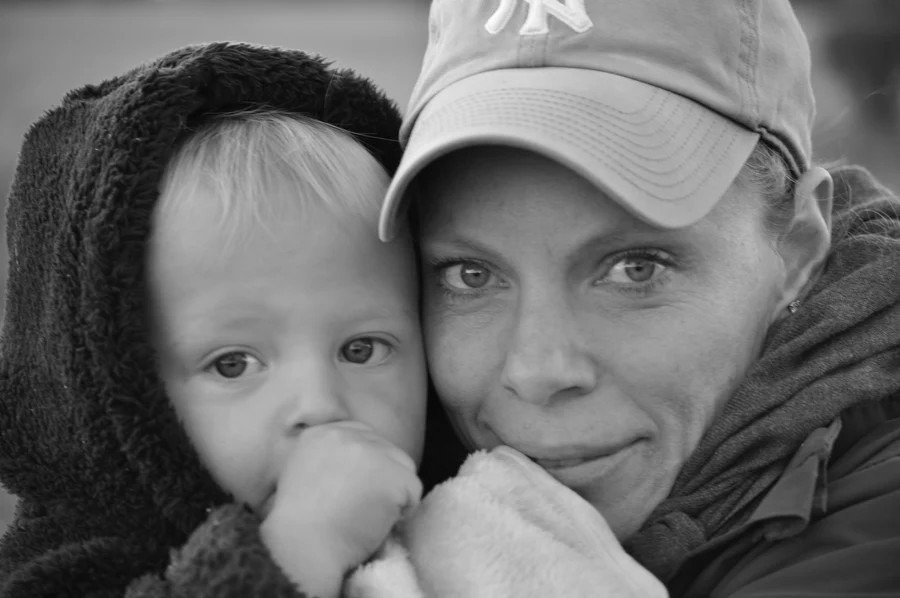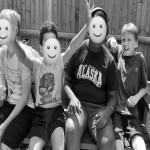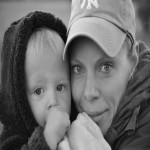What are the symptoms of autism and how to react? Well, the react part is easy (in hindsight) and that is...don't panic. Your child is exactly who they are meant to be and they always will be. The symptoms part is a little more tricky. Now that I know my son is autistic and I know so much more about autism in general there probably were very subtle things about him as a baby that were a little odd or different but, I am not even going to mention them because there is very little any of us can do about it until they are a little older when signs become more consistent and obvious plus, I really don't think parents should be constantly looking for signs of something being 'wrong' with their babies. Nothing will ever be wrong if they are autistic, their brains are simply wired differently.

Our journey with our now 12 year autistic, nonverbal or non-speaking and adhd son Henry began around the age of 2 where his pre-speech sounds and words stopped; he was increasingly not responding to his name being called; he did not seem to know where his body was in space and time; he played repetitively with unusual objects or parts of toys; he seemed to want to be alone & shouted an awful lot. We, like many others decided to have his hearing tested and not worry too much about the rest since he clearly wasn't ready to socialise, ah-hem! Roll forward 6 months to Henry starting nursery school, who by day 4 had lasted only 5 mins, then I decided to observe & that's when it really struck me how different he was to children his own age and he very clearly was overwhelmed by the environment. I had no idea what autism was and no-one said that word for quite some yet. We were encouraged to have him assessed by a paediatrician (who seemed extremely concerned & almost sad for me) who again, said nothing and roll forward a few more months to an intensive speech and language assessment, we discover he was developmentally, across the board, sitting at 9 months of age when he was 3 and a half! What a shock that was.

We enrolled Henry into an intensive therapy centre that was basically early intervention that absolutely transformed his and our lives and for first time made me feel both Henry and I were getting help, him to be understood and me to understand. Some of the Mums dragged me downstairs one day for a coffee and only then did I hear the word autism and in a rather flippant and cynical way "...so what's your son got then?..." I mumble something along the lines of 'Global Developmental Delay' and they respond "... oh yeah, sure, it's autism honey, he's autistic..." in a kind of 'welcome to our world' exasperated way. A few doom and gloom Google screens later at home and I was a train wreck but, quite a relieved train wreck because finally, I had something to work with and learn about, plus my son was actually going to be ok, on a different journey to his siblings but still ok.

The elevator version of how to get an autism diagnosis is go private! The lengthy waitlist times (years long and even private practices have waitlists now) are insane in the UK since covid and the process is a frustrating, slow, box ticking, totally impersonal one where you receive so little depth and understanding of what is in the assessments. You'll need an Educational Psychologist assessment + speech and language (SlT) and occupational therapist (OT) assessments. When visiting your GP to get referrals be confident, serious (preferably take your partner with you), specific about your concerns & and give off the body language of 'I am not leaving here without referrals'.
 The very broad explanation of what autism is, in total parent speak here...is difficulties or struggles with social communication, social imagination & social interaction. Social imagination relates to a thing they call 'Theory of mind' where for eg neuro-typicals looking at a painting of a picnic immediately know it's a picnic and they know exactly what that is all about whereas an autistic person will first see all the detail in the most accurate and incredible way like number of people, dogs, distance to lake, leaves on trees, squares on picnic blankets etc before they recognise it as a picnic. That picnic then is just that picnic ie a different picture of a picnic is an entirely different/new experience. If you're after the science and tech I'd look up National websites for diagnostic criteria and read things like the DSM-5 and the ICD-10! Or read a very fat and brilliant and highly academic book called Neurotribes (no, I haven't read it). For me, the most important thing to remember if you visualise a pyramid, is that the solid, largest, strongest base part is your child's personality, all the smaller levels on top of that and leading up to the point will be his/her cognitive function, social communication abilities, theory of mind etc. Try to stay focused on who they are.
The very broad explanation of what autism is, in total parent speak here...is difficulties or struggles with social communication, social imagination & social interaction. Social imagination relates to a thing they call 'Theory of mind' where for eg neuro-typicals looking at a painting of a picnic immediately know it's a picnic and they know exactly what that is all about whereas an autistic person will first see all the detail in the most accurate and incredible way like number of people, dogs, distance to lake, leaves on trees, squares on picnic blankets etc before they recognise it as a picnic. That picnic then is just that picnic ie a different picture of a picnic is an entirely different/new experience. If you're after the science and tech I'd look up National websites for diagnostic criteria and read things like the DSM-5 and the ICD-10! Or read a very fat and brilliant and highly academic book called Neurotribes (no, I haven't read it). For me, the most important thing to remember if you visualise a pyramid, is that the solid, largest, strongest base part is your child's personality, all the smaller levels on top of that and leading up to the point will be his/her cognitive function, social communication abilities, theory of mind etc. Try to stay focused on who they are.

If you are already struggling to connect with your child and things are a bit crazy at home in terms of mealtimes and dressing and leaving the house and bath time etc my initial tips would be to instil a good routine around those daily things you need them to do, nothing crazy just roughly the same things happening at the same time each day in the same-ish way so that they become predictable. Start to think about the sensory environment way beyond the regular 5 senses and know that they are hugely impacted by it: lights, sounds, smells, textures, temperatures, windows open/closed, people entering/exiting a room they are in, objects being moved etc. They may also struggle with making choices and simply use a default + transitions eg leaving the house but that can also become transitions from one room to another or upstairs to downstairs even. And definitely throw out all the rules around food especially the sitting on a chair, at a table, with other people, using cutlery (I mean why use a weird looking thing called a fork when you have hands?!).

Lastly, when things do start to go wrong and escalate into distress and maybe even overwhelm (not everything can be predictable and perfect on any given day, ever sadly and our world is absolutely not geared to the way their brains work at all), I would simply say to try your very best (and again, no-one is perfect here parents, cut yourselves some slack, forgive yourselves and move on) to stop whatever you are doing, strip yourself and your mind of every single expectation, need to fix; need to work out why; need to help; need to anything; want anything), and just literally be with them; on their level as close as you are allowed or as is safe and say nothing, do nothing, resonate through body language how they must be feeling and just be, anywhere between 5-15mins. It will pass, they may then feel tired, as though hours have passed, and they might be thirsty and hungry too.
Talk to people, read, look for local support groups, involve your family right from the start and be kind to yourselves. You are not alone and he/she is going to be ok.






